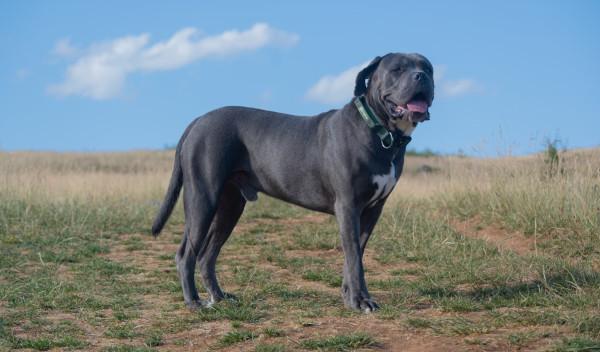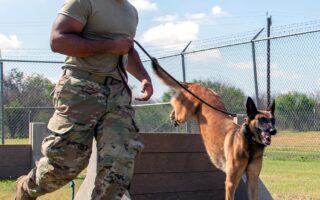Unlocking the Potential: A Comprehensive Guide to Cane Corso Training
In the realm of canine companionship, few breeds command as much respect and admiration as the Cane Corso. With their powerful stature and unwavering loyalty, these majestic guardians have earned their place as both protectors and family members. However, owning a Cane Corso is not merely about relishing in their impressive aesthetics; it necessitates a commitment to training that harnesses their strength and intelligence. This article delves into the art of Cane Corso training, unveiling strategies and insights that will empower both novice and experienced owners to cultivate a well-rounded, obedient companion. From understanding their unique temperament to exploring effective training techniques, we embark on a journey that promises to enhance the bond between you and your Cane Corso while ensuring they thrive in a world filled with challenges and opportunities.
Table of Contents
- Understanding the Temperament of Cane Corsos for Effective Training
- Essential Techniques for Socialization and Obedience in Cane Corsos
- Managing Behavioral Challenges: Tips for Training Success
- Building a Strong Bond: The Role of Positive Reinforcement in Cane Corso Training
- Q&A
- Future Outlook
Understanding the Temperament of Cane Corsos for Effective Training
Understanding a Cane Corso’s temperament is essential for shaping a training approach that resonates with their unique personality traits. These dogs are known for their loyalty, intelligence, and protective instincts. Recognizing the balance between their affectionate nature and assertive demeanor can significantly enhance the training experience. It is vital to implement training methods that acknowledge their natural tendencies while ensuring they remain well-behaved companions. A positive reward-based training system works wonders, reinforcing desired behaviors and building a strong bond between the dog and owner.
To effectively train a Cane Corso, it is important to establish clear communication and consistency from an early age. Here are some key points to consider:
- Socialization: Early exposure to various environments, people, and other animals to develop well-rounded behavior.
- Leadership: Be a strong, confident leader; Cane Corsos respond well to authority but require fairness and patience.
- Training Sessions: Keep sessions short but engaging to maintain their focus, utilizing play as a reward.
- Regular Exercise: Regular physical activity is crucial to help channel their energy positively.
| Temperament Trait | Training Technique |
|---|---|
| Protective | Desensitization to stimuli |
| Loyal | Bond-building exercises |
| Intelligent | Advanced obedience training |
| Affectionate | Positive reinforcement |
Essential Techniques for Socialization and Obedience in Cane Corsos
Socialization is a critical component of training your Cane Corso. Given their strong-willed nature, introducing them to a variety of people, environments, and situations at an early age fosters adaptability and reduces potential anxiety. Here are some effective techniques for promoting successful social interactions:
- Positive Exposure: Gradually introduce your dog to new sights, sounds, and experiences, always rewarding calm behavior.
- Puppy Classes: Enroll your Cane Corso in puppy socialization classes to meet other dogs and people under controlled conditions.
- Daily Walks: Take regular walks in different neighborhoods to expose your dog to new faces and environments.
- Playdates: Arrange supervised playdates with well-mannered dogs to encourage confidence and proper dog etiquette.
Obedience training complements socialization by establishing essential commands and reinforcing structure in your Cane Corso’s life. Implement these effective training strategies:
| Command | Training Tip |
|---|---|
| Sit | Use treats to guide them into a sitting position, and provide praise once they comply. |
| Stay | Start with short distances; gradually increase as they become more reliable. |
| Come | Always reward effectively to ensure your Cane Corso associates this command with positive outcomes. |
| Leave it | Practice by placing enticing items on the floor and rewarding them for not engaging. |
Managing Behavioral Challenges: Tips for Training Success
Training a Cane Corso requires patience and understanding, especially when faced with behavioral challenges. These dogs are naturally strong-willed and intelligent, which can sometimes lead to stubbornness. To ensure effective training, it’s essential to adopt the right strategies. Start by establishing a consistent routine that includes regular training sessions, playtime, and socialization opportunities. This not only keeps your dog engaged but also helps reinforce positive behaviors.
Utilizing positive reinforcement techniques is crucial when addressing behavioral issues. Reward your Cane Corso with treats, praise, or play when they exhibit desirable behaviors. To further support your training efforts, consider implementing the following tips:
- Be clear and consistent: Use the same commands and rewards to avoid confusion.
- Keep training sessions short: Aim for 5-10 minute sessions to maintain your dog’s focus.
- Socialize your dog: Expose them to different environments, people, and other animals.
- Stay calm and assertive: Your Cane Corso will look to you for leadership.
| Common Behavioral Challenges | Training Tips |
|---|---|
| Leash Pulling | Use a no-pull harness and reward loose leash walking. |
| Barking | Identify triggers and teach a quiet command with positive reinforcement. |
| Aggression | Seek professional guidance, practice desensitization techniques. |
Building a Strong Bond: The Role of Positive Reinforcement in Cane Corso Training
Training your Cane Corso using positive reinforcement is not just effective; it also fosters a lasting bond between you and your dog. This approach is centered around the idea of rewarding desirable behaviors instead of punishing the unwanted ones. By consistently applying this technique, you can ensure that your Corso associates training with fun and success, making them eager to learn. When using treats, praise, or playtime as rewards, you can enhance your dog’s confidence and make the training experience enjoyable. This harmonious relationship accelerates learning and helps cultivate trust, leading to a more obedient and well-adjusted companion.
To implement a positive reinforcement strategy effectively, consider the following tips:
- Timing is Key: Reward your Cane Corso immediately after they exhibit the desired behavior to reinforce the action.
- Consistency Matters: Use the same commands and gestures each time to avoid confusion.
- Gradual Progression: Start with simple commands and gradually increase complexity as your dog becomes more proficient.
- Variety of Rewards: Mix rewards to keep your dog interested, ranging from treats to toys or extra playtime.
A structured yet flexible training plan can significantly enhance the effectiveness of positive reinforcement. To help you keep track, the following table outlines a simple weekly training schedule that incorporates varied rewards:
| Day | Focus Command | Reward Type |
|---|---|---|
| Monday | Sit | Treats |
| Tuesday | Stay | Playtime |
| Wednesday | Come | Praise |
| Thursday | Heel | Toys |
| Friday | Down | Treats |
Q&A
Q&A: Mastering Cane Corso Training
Q1: What makes the Cane Corso a unique breed that requires specialized training?
A1: The Cane Corso, a majestic and powerful breed known for its loyalty and protective nature, is also remarkably intelligent. This combination of strength and smarts means they thrive on structure and discipline in training. Their history as guardians of livestock and property has endowed them with a strong protective instinct, which, while advantageous, necessitates careful and consistent training to ensure they are well-mannered family members.
Q2: At what age should training begin for a Cane Corso?
A2: Training should ideally begin as early as eight weeks old. Early socialization is crucial, as it helps the Cane Corso develop into a well-adjusted adult dog. Exposing them to various environments, people, and other animals from a young age can mitigate potential behavioral issues down the line. Continuous training throughout their formative years fosters their natural intelligence and willingness to learn.
Q3: What are some essential commands every Cane Corso should learn?
A3: Basic commands such as ”sit,” “stay,” “heel,” and “come” are vital for any Cane Corso. These foundational commands not only promote good behavior but also ensure safety, especially given their size and strength. Once your Cane Corso has mastered these, more advanced commands and tricks can be introduced to keep their minds engaged and stimulate their problem-solving skills.
Q4: How can owners incorporate socialization into their training?
A4: Socialization involves introducing your Cane Corso to a variety of people, environments, and other dogs. This can be achieved through puppy classes, safe dog parks, and home gatherings. Positive reinforcement is key here; rewarding calm and friendly behavior helps the dog associate new experiences with good outcomes. Remember, the goal is to create a well-rounded canine that can comfortably navigate different social scenarios.
Q5: What training methods are most effective for Cane Corso?
A5: Positive reinforcement techniques work best with this breed, as they respond well to praise, treats, and play. Encourage good behavior rather than focusing solely on corrections. Consistency is crucial; using the same commands and maintaining a regular training schedule helps reinforce learning. Patience is essential as well—Cane Corsos may take time to absorb new information, but with dedication, they’ll shine.
Q6: How can I address stubbornness or difficulty in training a Cane Corso?
A6: Stubbornness can sometimes be a trait of the Cane Corso, especially if they feel bored or unchallenged. To combat this, keep training sessions engaging and varied. Incorporating agility challenges or interactive games can stimulate their minds and make learning exciting. If challenges persist, seek the help of a professional trainer who understands the nuances of the breed, ensuring you receive tailored strategies for your unique situation.
Q7: What is the best environment for training a Cane Corso?
A7: A calm, distraction-free environment is optimal for initial training sessions. As your Cane Corso progresses, gradually introducing distractions—like other pets or outdoor settings—helps teach focus amidst excitement. A blend of structured indoor training and outdoor socialization sessions will provide well-rounded experiences that complement their learning.
Q8: How can ongoing training contribute to a Cane Corso’s well-being?
A8: Regular training sessions provide more than just obedience; they offer mental stimulation which is crucial for a breed like the Cane Corso. A mentally enriched dog is less likely to develop behavioral problems stemming from boredom or pent-up energy. Additionally, ongoing training fosters a stronger bond between the owner and the dog, built on trust and mutual respect.
Q9: Any final tips for success in training a Cane Corso?
A9: Consistency, patience, and positive reinforcement are your best friends. Celebrate small victories, and always end training sessions on a high note. Keep in mind that each Cane Corso is unique; some may excel in particular areas while needing more time in others. Tailor your approach to fit your dog’s personality and learning style, and remember to enjoy the journey of discovering the amazing potential within your Cane Corso!
Future Outlook
training a Cane Corso is not just about instilling commands; it’s about forging a deep bond built on trust, respect, and communication. As these remarkable dogs grow into loyal companions, their well-rounded training will not only enhance their natural abilities but also ensure their place as cherished family members. By committing time, patience, and consistency to their training, you’ll unlock the true potential of this noble breed. Whether you’re just beginning your journey or looking to refine existing skills, remember that every session is an opportunity to strengthen your relationship. As you both learn and grow together, the rewards will be immeasurable—providing companionship, protection, and an unbreakable connection that lasts a lifetime. Embrace the experience, and in doing so, you’ll discover the unique joy of sharing your life with a Cane Corso.


